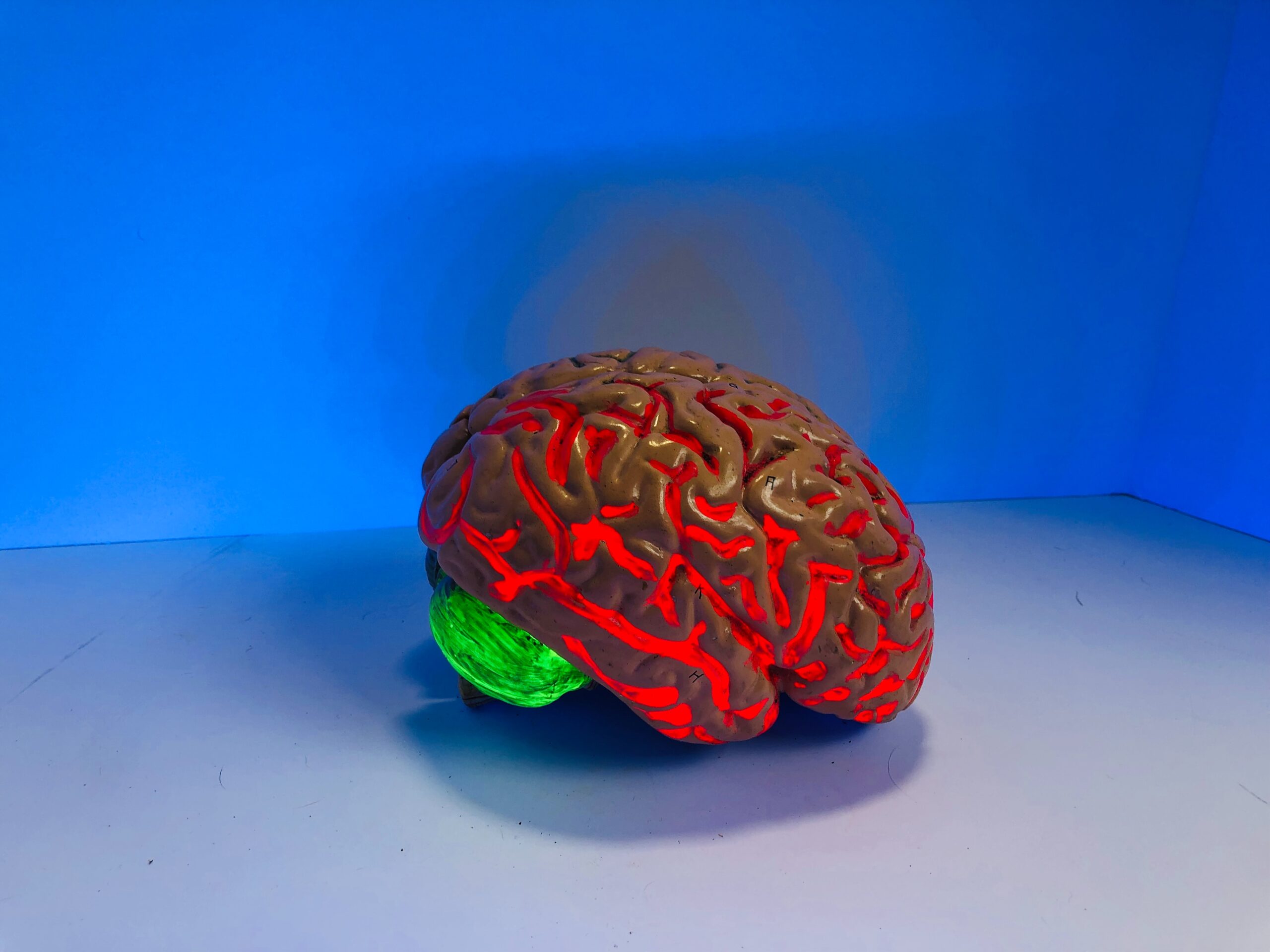Tracey Tokuhama-Espinosaa  and Ali Nourib
and Ali Nourib 
aFaculty of Arts and Sciences, Harvard University Extension School, Cambridge, MA, USA; bDepartment of Education, Malayer University, Malayer, Iran
Abstract
The purpose of this study was to evaluate the current initiatives in the field of Mind, Brain, and Education (MBE) science that have potentially impacted the teaching-learning dynamic. Previous research, including a 2007-2008 International Delphi Panel on Mind, Brain, and Education, and a 2017 International Delphi Panel 10-year follow-up (Tokuhama-Espinosa, 2017) served as the primary source of review. The 2019-2020 survey sought to confirm the validity of the 2017 findings as well as to address additional components of teacher practices. Three-hundred and fifty-eight experts were invited to participate, and 112 actually completed the survey. These MBE, Educational Neuroscientists and Neuroeducators came from 30 different counties and were asked nine questions in which there was varying levels of consensus, suggesting a growing global consensus on teacher knowledge that should be incorporated into educator professional development. More research is needed on programs proclaiming to use Mind, Brain, and Education science in comparison with findings from this study in order to validate both current practice as well as explore new areas of teacher education.
Keywords
Mind, Brain, and Education science; educational neuroscience; neuroeducation; teacher education; educational professional development
Introduction
This study evaluated the current initiatives in the field of Mind, Brain, and Education (MBE) science that have potentially impacted the teaching-learning dynamic. Previous research, including a 2007-2008 International Delphi Panel on Mind, Brain, and Education, and a 2017 International Delphi Panel 10-year follow-up (Tokuhama-Espinosa, 2017)[1] served as the primary source of review.[2] The 2019-2020 survey sought to confirm the validity of the 2017 findings as well as to address additional components of teacher practices. The authors hope that the results of this survey will further advance understanding of teaching and learning by determining what credible information should be shared with teachers from Mind, Brain, and Education science.
Methodology
The present study employed a deductive qualitative online survey. Participants were selected using a criterion-based sampling technique. The final list of people invited to participate in the survey included 358 people[3] who were identified as influential in shaping MBE policy, practice and research. Of the 358 invitations sent, 112 people from 30 different countries completed the survey. Invitations were sent through email. Responses were gathered through SurveyMonkey© and one response was accepted per invitation. The survey had 42 questions and took an average of 22 minutes to complete. The wording of the survey questions on principles and tenets was based on the consensus of the 2017 Delphi findings.
One of the goals of this study was to determine if there was international agreement on what should be part of teacher training from a Mind, Brain, and Education science perspective. To do this, the current study sought answers to nine questions:
- What principles of learning are supported by Mind, Brain, and Education research?
- What tenets of learning are supported by Mind, Brain, and Education research?
- What key concepts should be included in basic teacher knowledge?
- What are the lasting contributions of Mind, Brain, and Education science to educational practice, policy and/or research?
- What is the main aim of education based on Mind, Brain, and Education science?
- What changes should be made in the current education system?
- What should children be taught about the brain and learning?
- How do experts distinguish the field of Mind, Brain, and Education science from Educational Neuroscience and Neuroeducation?
- What are some possible careers for Mind, Brain, and Education science?
The first six questions are explained in this article.
Most survey responders self-identified as being from Education (23%), and the second largest group from Mind, Brain, and Education (19%). This was followed by Cognitive Neuroscience (10%), Educational Psychology (9%), Educational Neuroscience (8%), Developmental Psychology (6%), Cognitive Psychology (5%) and Neuroscience (5%). This created an imperfect, but relatively balanced input from people from in different learning sciences.
This survey cast a broad net in hopes of gathering an international perspective on the topic. The final list of people who participated came from 30 different countries: Argentina, Australia, Austria, Belgium, Brazil, Canada, Chile, China, Costa Rica, Finland, France, Germany, Holland, Hungarian, Iran, Israel, Italy, Japan, Mexico, New Zealand, Portugal, Russia, Slovenia, South Africa, South Korean, Spain, Sweden, Switzerland, UK, and USA.
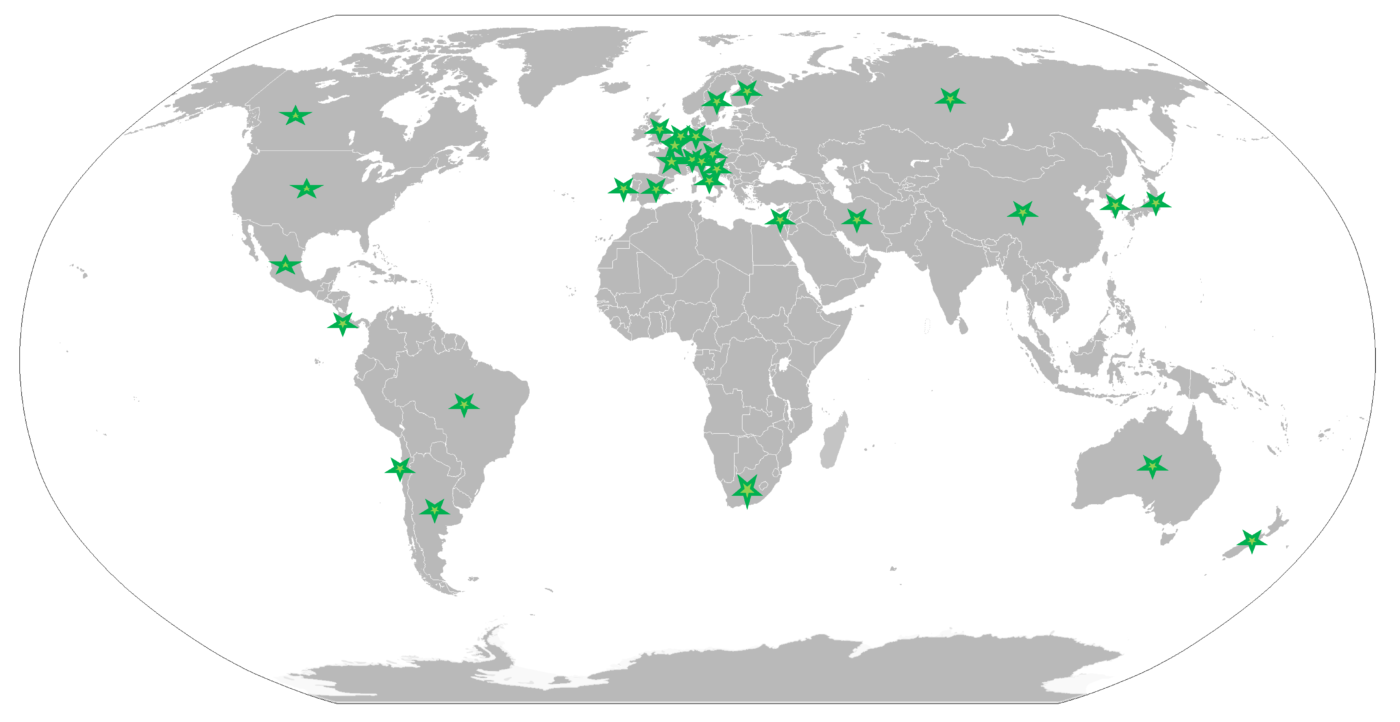
Figure 1. World Map Depicting Country Participation in the Survey. Note: Each star depicts at least one participant.
Findings
Q. 1 What principles of learning are supported by MBE research?
In this survey, the term principle is referred to as a concept which is “universal” and has robust evidence for human brains independent of age, gender, or culture. Participants were asked to review six statements that are listed as the principles of learning (Tokuhama-Espinosa, 2017) (Table 1) and to answer if they agreed, disagreed or had no basis to reply. They were also invited to comment after each statement. The participants agreed with all six tenets, but to differing degrees, as seen in Table 1.
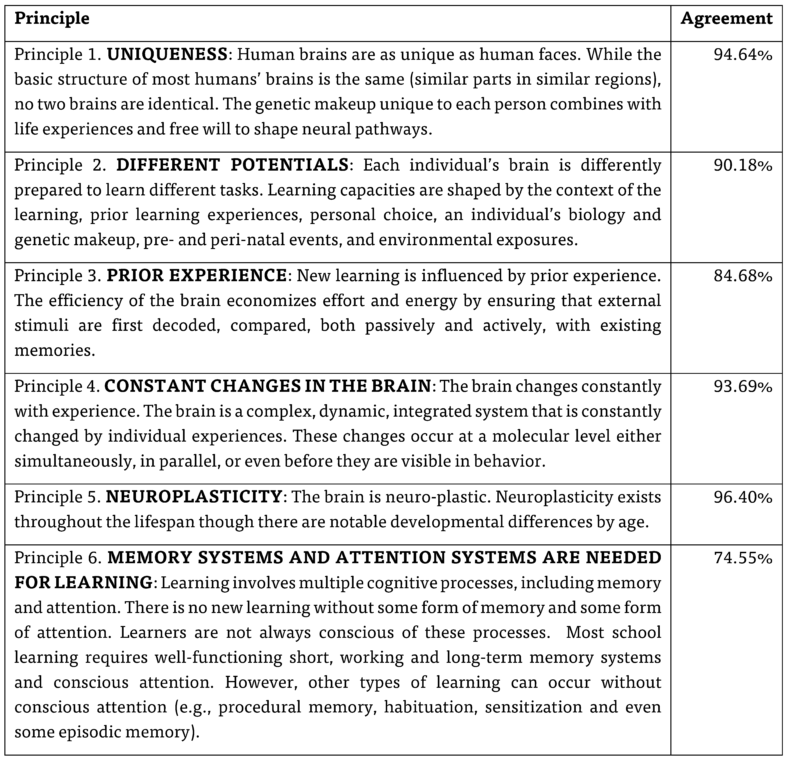
Table 1. Mind, Brain, and Education Principles 2020 Results. Note: If a Principle had less than 75% agreement it was modified in wording to reflect participants’ comments. The evidence supporting the principles supplied by the 2017 Delphi panel and updated by the authors in 2020 can be found here.
Q. 2 What tenets of learning are supported by MBE research?
In this survey, the term tenet is a concept that is true for all people but with a large degree of human variation either due to culture, genetics, or prior experiences. Participants were asked to review 21 statements that are listed as the tenets of learning and to answer if they agreed, disagreed or had no basis to reply. The participants agreed with all 21 tenets, but to differing degrees, as seen in Table 2.
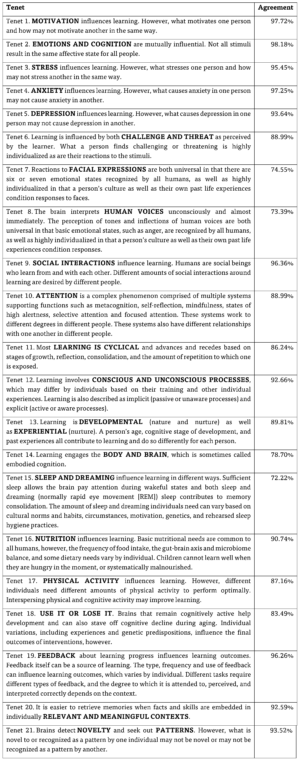
Table 2. Mind, Brain, and Education Tenets 2020 Results. Note: Those with less than 75% agreement were modified in wording to reflect participant comments. The evidence supporting the tenets supplied by the 2017 Delphi panel and updated by the authors in 2020 can be found here.
Q. 3 What key concepts should be included in basic teacher knowledge?
Participants were queried about what teachers should know about Mind, Brain, and Education topics. The participants were shown 11 areas of conceptual knowledge identified by members of the 2017 International Delphi Panel and were asked if they are important for teachers to know or not. They were invited to add additional concepts they thought necessary. Finally, participants were also asked an open-ended question: “What do you wish all teachers knew about the brain?” The resulting list may be considered the key conceptual knowledge to design effective teacher professional development on Mind, Brain, and Education.
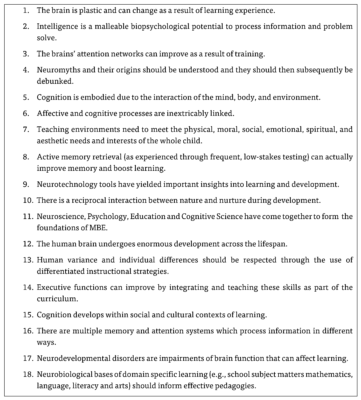
Table 3. Key concepts in basic teacher knowledge related to the learning sciences. Note: Multiple comments were synthesized into these single statements. Participants were given the chance to review and critique before this publication.
Q. 4 What are the lasting contributions of Mind, Brain, and Education science to educational practice, policy and/or research?
In an open-ended question, participants were asked: “Globally, what would you say have been the lasting contributions of Mind, Brain, and Education science/Educational Neuroscience/Neuroeducation to educational practice, policy and/or research?”

Table 4. What are the lasting contributions of Mind, Brain, and Education science? Note: Multiple comments were synthesized into these single statements. Participants were given the chance to review and critique before this publication.
Q. 5 What is the main aim of education based on Mind, Brain, and Education science?
Participants were asked an open-ended question: “What is the main aim of education based on Mind, Brain, and Education science?”
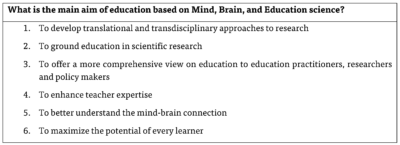
Table 5. The main aims of Mind, Brain, and Education science. Note: Multiple comments were synthesized into these single statements. Participants were given the chance to review and critique before this publication.
Q. 6 What changes are needed in education from a Mind, Brain, and Education perspective?
This was an open-ended question: “From an MBE perspective and in your opinion, what changes should be made in the current education system?”
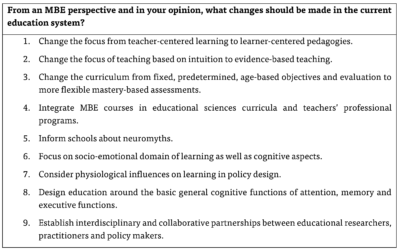
Table 6. Changes Needed in Education from a Mind, Brain, and Education Perspective. Note: Multiple comments were synthesized into these single statements. Participants were given the chance to review and critique before this publication.
Discussion
This survey sought to better understand if there were elements of teacher education that could and should be incorporated consistently in teacher education. Findings indicate a growing, though not universal, consensus of what should be included in teachers’ basic pedagogical knowledge as related to contributions from MBE.
As this study began, it was interesting to note that some questioned the need for more research on teacher knowledge related to Mind, Brain, and Education science. A few participants actually said that this seems a little “ridiculous” as “everyone already knows” this information. While we agree there is robust evidence, as seen in the more than 4,200+ documents which are embedded in the descriptions of the principle, tenets and guidelines in this report, it is precisely because this information is not yet common knowledge for teachers that we decided to embark on this study.
Several initiatives are underway right now that promote the conscientious understanding, research and application of evidence-based practices about human learning, including knowledge about the brain and body in classroom settings and beyond. However, there remain close to a hundred neuromyths that are commonly sprinkled throughout teacher professional development, which are promoted by unknowing or unscrupulous teacher trainers. We hope that the information here will serve as a broad, internationally accepted parameter to guide educators’ professional development.
There were four important themes which were echoed throughout participant comments.
The first is that most experts in the fields of Mind, Brain, and Education science know many, or even most, of the ideas presented in this report. While knowledgeable, however, most have not spent a lot of time considering the classroom applications of this information in real student-teacher learning dynamics. That is, the researcher-practitioner model remains relatively rare. Few teachers research well; few researchers teach well. This suggests more work is needed to nurture a new type of professional at the crossroads not only of mind (psychology), brain (neuroscience) and education, but also at the intersection of research and teacher practice.
Second, some participants in this study either over- or underestimate the impact of certain scientific findings on learning. It was not uncommon to find a participant acknowledge something as being true, but then label it as “unimportant in education”. For example, one scientist said that it was true that facial expressions conveyed emotions, but then commented that it was unclear how this had any role in education. Similar comments were made about the ways that sleep and dreaming, physical activity, and challenges and threat are related to learning. Such comments suggest many people remain unaware of how the teaching-learning dynamic can potentially be shaped by this information.
Third, several participants commented on the need to balance attention for the unique aspects of human learning with the globally similar aspects of human learning. This means that teachers should be taught both that humans as a species are remarkably similar in how we learn to read or do math problems, while at the same time appreciate how and why we also differ in learning these skills. Both the similarities of human minds and brains, as well as the differences, should play a role in teacher education. Indeed, most of the remarkable imaging research over the past decade calls attention to how amazingly similar neural pathways are for estimating non-symbolic magnitude, common nutritional needs to fuel thinking, or learning how to read, for example. Similar does not mean identical, however. This means that while the differences between human brains must be acknowledged to tailor learning experience to the individual, so should teachers be taught about the ways brains are the same so that they can take advantage of “typical” learning trajectories.
Fourth, there was a sincere concern by many that short, abbreviated statements can never capture the complexity of the science behind them. Several people agreed that helping teachers have better access to information was important, but that this should not be done through “edible science,” as one put it. One neuroscientist suggested that writing for a general audience always puts the integrity of the science at risk. Several initiatives can help here, including more and better researcher-practitioners in the field, improved scientific literacy by all teachers, and a change in attitude that embraces complexity over quick fixes in teacher education. This places a very important role on the translators and teacher trainers that use this information, who must do so responsibly and based solely on the evidence.
Mind, Brain, and Education science, along with Educational Neuroscience and Neuroeducation, are growing up and into their own potentials. As with any emerging entity, there are many rough edges to refine, and many traits to define. The authors hope that this report contributes to the discussions, debates, and decisions about who we hope to become as learning scientists in these exciting times.
Notes
[1] The 2017 International Delphi Panel on Mind, Brain, and Education can be found here.
[2] This 100-page summary is meant to identify the highlights of the report. The full compiled report and raw data are available from the authors. Contact tracey.tokuhama@gmail.com.
[3] The list of invitees can be found here.
Funding Details and Disclosure Statement
The authors worked independently and did into receive funding from any external sources. The authors declare there are no conflicts of interest.
References
Tokuhama-Espinosa, T. N. (2017). International Delphi panel on mind brain, and education science. https://doi.org/10.13140/RG.2.2.14259.22560
Notes on contributors
Tracey Tokuhama-Espinosa, Ph.D. is an alumna of the Harvard Graduate School of Education, and currently a professor at the Harvard University Extension School in a course called Neuroscience of Learning: An Introduction to Mind, Brain, Health and Education. She serves as Associate Editor of the Nature Partner Journal Science of Learning.
Ali Nouri, Ph.D. is a curriculum specialist and educational neuroscientist who studies the neurocognitive bases of learning and cognition, and their implications for curriculum design and development. He works as associate professor in the department of educational studies at Malayer University, Iran.
Tracey Tokuhama-Espinosa
Faculty of Arts and Sciences, Harvard University Extension School, Cambridge, MA, USA
![]() https://orcid.org/0000-0002-0661-4586
https://orcid.org/0000-0002-0661-4586
Ali Nouri
Department of Education, Malayer University, Malayer, Iran
![]() https://orcid.org/0000-0002-4851-265X
https://orcid.org/0000-0002-4851-265X


